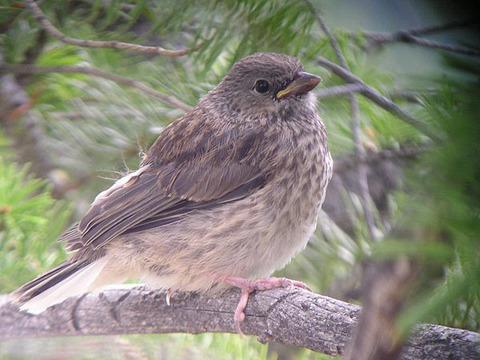当前位置:
X-MOL 学术
›
Funct. Ecol.
›
论文详情
Our official English website, www.x-mol.net, welcomes your
feedback! (Note: you will need to create a separate account there.)
Risk of predation on offspring reduces parental provisioning, but not flight performance or survival across early life stages
Functional Ecology ( IF 4.6 ) Pub Date : 2020-08-07 , DOI: 10.1111/1365-2435.13650 James C. Mouton 1 , Bret W. Tobalske 2 , Natalie A. Wright 2, 3 , Thomas E. Martin 4
中文翻译:

被后代捕食的风险会降低父母的养分,但不会降低整个早期生命阶段的飞行表现或生存率
更新日期:2020-10-07
Functional Ecology ( IF 4.6 ) Pub Date : 2020-08-07 , DOI: 10.1111/1365-2435.13650 James C. Mouton 1 , Bret W. Tobalske 2 , Natalie A. Wright 2, 3 , Thomas E. Martin 4
Affiliation

|
- Developmental responses can help young animals reduce predation risk but can also yield costs to performance and survival in subsequent life stages with major implications for lifetime fitness. Compensatory mechanisms may evolve to offset such costs, but evidence from natural systems is largely lacking.
- In songbirds, increased nest predation risk should favour reduced provisioning, but also young that fledge (leave their nest) at an earlier age. Both responses can result in fledglings with shorter wings, reduced mobility and decreased survival. Young may compensate for shorter wings developmentally by reallocating resources towards feather development or behaviourally by adjusting flight kinematics or habitat use. However, underfed young may lack the capacity to express these phenotypes due to insufficient resources or an inability to adjust allocation of resources.
- Using predation risk experiments and 29 years of observational field data, we test whether increased nest predation risk reduces flight performance and survival during the fledgling stage and explore potential mechanisms that might underlie these effects. We show that young from high‐risk nests did not leave the nest earlier on average, but wing growth was slower likely due to observed reductions in parental feeding rates. Wings were shorter in high‐risk nests when fledglings left the nest early. Yet, fledglings from high‐risk nests showed improved flight performance for a given wing length such that flight performance at fledging did not differ between young from high‐risk and low‐risk nests. Young from high‐risk nests may have offset the costs of shorter wings on flight performance by accelerating the emergence of flight feathers from their sheaths to reduce wing porosity, though evidence for this mechanism was mixed. Fledglings from high‐risk nests also selected habitat with denser woody vegetation compared with young from low‐risk nests.
- Together, these developmental and behavioural responses seem to mitigate the expected effects of increased nest predation risk on fledgling survival. Ultimately, our results show that offspring predation risk can affect parental provisioning and offspring morphology without major implications for performance and survival in subsequent life stages.
中文翻译:

被后代捕食的风险会降低父母的养分,但不会降低整个早期生命阶段的飞行表现或生存率
- 发育反应可以帮助幼兽降低捕食风险,但也可能在随后的生命阶段中降低性能和生存成本,这对一生的适应性具有重大影响。补偿机制可能会发展起来以抵消这种成本,但是自然系统的证据却很缺乏。
- 在鸣禽中,增加巢穴捕食的风险应该有利于减少配置,但也有利于幼鸟早起时立马(离开巢穴)。两种反应都可能导致羽翼较短的雏鸟,行动不便和存活率下降。年轻人可能会通过重新分配资源以发展羽毛来补偿较短的翅膀,或者通过调整飞行运动学或栖息地使用来补偿行为。但是,由于资源不足或无法调整资源分配,未充分喂养的年轻人可能缺乏表达这些表型的能力。
- 利用捕食风险实验和29年的观测数据,我们测试了巢捕食风险的增加是否会降低雏鸟阶段的飞行性能和生存率,并探讨可能是这些影响的潜在机制。我们显示,高风险巢中的幼鸟平均没有提前离开巢,但是由于观察到父母的进食率降低,翅膀的生长可能较慢。当雏鸟提前离开巢穴时,高风险巢穴的翅膀较短。但是,高风险巢穴的雏鸟在给定的机翼长度上显示出改进的飞行性能,因此幼龄和高风险巢穴与低风险巢穴的雏鸟飞行性能没有差异。高风险巢中的幼虫可能通过加速从其鞘中出现的飞行羽毛以减少机翼孔隙率而抵消了较短机翼对飞行性能的影响,尽管这种机理的证据还很复杂。与来自低风险巢穴的幼鸟相比,来自高风险巢穴的幼鸟也选择了具有茂密木本植被的栖息地。
- 总之,这些发育和行为反应似乎减轻了巢捕食风险增加对雏鸟生存的预期影响。最终,我们的结果表明,后代被捕食的风险可以影响父母的供应和后代的形态,而对以后的生活表现和生存没有重大影响。







































 京公网安备 11010802027423号
京公网安备 11010802027423号